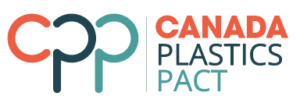The Canada Plastics Pact is leading Canada’s response to the escalating plastic crisis. We exist to eliminate plastic waste by accelerating and scaling the solutions that will keep plastics in the economy and out of people, animals and the environment. Through fostering innovation and collaboration, our 100+ Partners from across the plastics value chain are taking meaningful steps to eliminate unnecessary and problematic plastics, redesign packaging and increase their use of recycled plastic.

Define a list of plastic packaging that is to be designated as problematic or unnecessary and take measures to eliminate them
100%
plastic packaging designed to be reusable, recyclable or compostable
50%
of plastic packaging is effectively recycled or composted
30%
recycled content across all plastic packaging
The Canada Plastics Pact is a member of the Ellen MacArthur Foundation’s Plastics Pact network, a globally aligned response to plastic waste and pollution, that enables vital knowledge sharing and coordinated action. The Foundation, through its New Plastics Economy initiative, has united more than 1,000 organizations behind a common vision for a circular economy for plastic.
Together, we are tackling plastic pollution with plastic solutions.
This report provides five recommendations for Canadians to evolve the plastics economy from one that is linear and wasteful to one that offers economic growth without waste.
The Canadian Council of Ministers of the Environment (CCME) approved in principle the Canada-wide Strategy on Zero Plastic Waste, which aims to reduce plastic waste, support improved reuse and value recovery to reducing the amount of plastic released in our environment.
The Canadian Council of Ministers of the Environment (CCME) approved in principle the Canada-wide Strategy on Zero Plastic Waste (the Strategy), to reduce plastic waste and pollution and recover the value of plastics through reuse, repair, remanufacture, refurbishment and recycling.
Canada Plastics Pact is a unique multi-stakeholder, industry-led, cross-value chain collaboration platform which aims to tackle plastic packaging waste and pollution by bringing together businesses, government, non-governmental organizations and other key actors in the local plastics value chain who are united, working together on achieving clear, actionable targets by the year 2025.
The Canada Plastics Pact Roadmap is a shared action plan that will result in real progress to reduce plastic waste in Canada. Built through unprecedented collaboration between companies, organizations, and governments across the entire plastics value chain, this Roadmap presents a shared vision for a circular economy for plastics packaging and a collaborative action plan to drive tangible change by 2025.
The Golden Design Rules for Plastic Packaging provides guidance and global standards for Canadian companies to adjust their packaging design and contribute to a circular economy for plastics packaging.
The Baseline Report marks an important starting point for the CPP and its efforts to transition to a more circular economy for plastics packaging in Canada, with an emphasis on collaboration to drive the systems change required.
The High Ambition Coalition to End Plastic Pollution is committed to develop an ambitious international legally binding instrument based on a comprehensive and circular approach that ensures urgent action and effective interventions along the full lifecycle of plastics.
The first session of the Intergovernmental Negotiating Committee to develop an international legally binding instrument on plastic pollution, including in the marine environment (INC-1), took place at Punta del Este Convention and Exhibition Centre, Uruguay.
More than 100 individuals representing more than 50 organizations from across the plastics value chain gathered in Toronto for a day of knowledge sharing and collaboration to continue to work towards building a circular economy for plastics packaging in Canada.
CPP publishes an aggregated overview of the reporting data from CPP Partners during its launch year.
This national ecosystem scan evaluates and highlights the opportunities to implement reuse and refill systems as a way to reduce the amount of single-use plastic waste and move towards a more circular economy for plastic packaging.
The Canada Plastics Pact (CPP), the Chemistry Industry Association of Canada (CIAC), Circular Materials, the Circular Plastics Taskforce (CPT), Éco Entreprises Québec (ÉEQ), Recycle BC, and The Film and Flexibles Recycling Coalition of the The Recycling Partnership joined forces to launch PRFLEX, an initiative aimed at improving the recovery and recycling rates of flexible plastics collected from Canadian households.
Built through collaboration between companies, organizations, and governments across the entire plastics value chain, this 5- Year Flexibles Roadmap presents a shared vision for a circular economy for flexible plastic packaging and a collaborative action plan to drive tangible change between now and 2027.
A wide range of stakeholders, including resin producers, manufacturers, retailers, government representatives, recyclers, NGOs, and others, gathered with a shared vision of advancing a circular plastics economy in Canada.
This paper explores the challenges the Canadian consumer packaged goods industry faces with plastics data gaps as it strives to achieve reductions in overall packaging waste – plastics and other single-use materials – alongside carbon emission reduction goals.
 The Canada Plastics Pact is a member of the Ellen MacArthur Foundation’s Global Plastics Pact network. It operates as an independent initiative of The Natural Step Canada, a national charity with over 25 years experience advancing science, innovation and strategic leadership to foster a strong and inclusive economy that thrives within nature’s limits.
The Canada Plastics Pact is a member of the Ellen MacArthur Foundation’s Global Plastics Pact network. It operates as an independent initiative of The Natural Step Canada, a national charity with over 25 years experience advancing science, innovation and strategic leadership to foster a strong and inclusive economy that thrives within nature’s limits.
